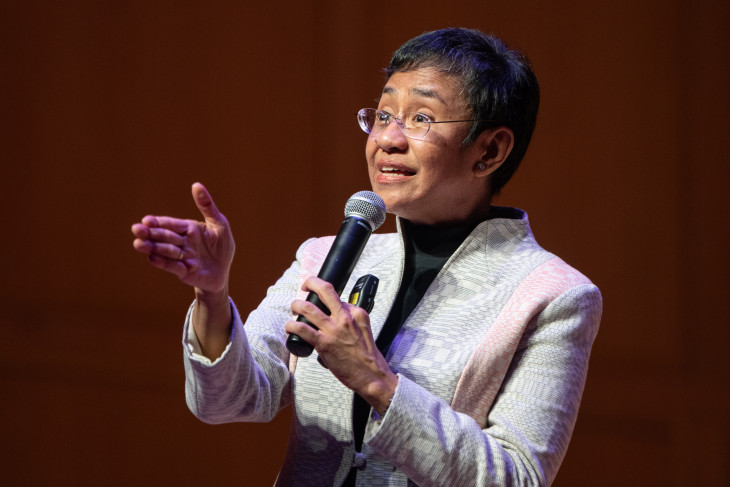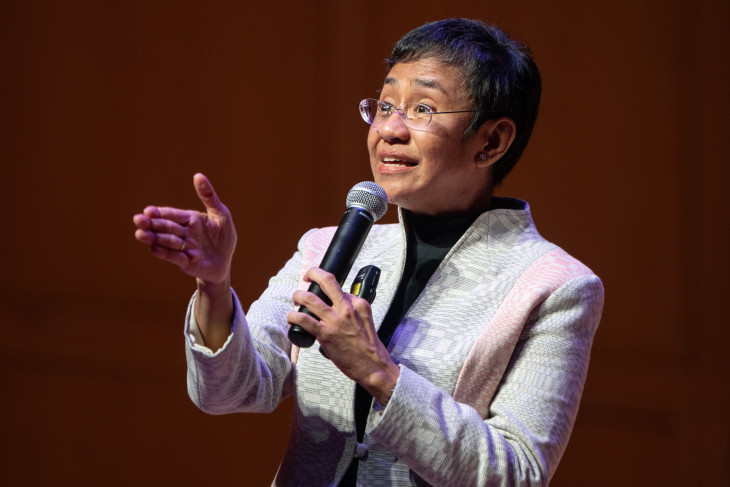Nobel prize recipient encourages Ubben audience to find truth through facts

World War III is happening to each of us on social media,” international journalist and 2021 Nobel Peace Prize recipient Maria Ressa told an audience at DePauw University. “It is a battle for our minds, a battle of our emotions, a battle of our values that ultimately determine our reality.”
In a Timothy and Ubben Lecture, “Truth, Freedom, and Our Future,” Ressa offered a presentation based on facts and evidence, arguing, in her words, “Why social media is bad for you.”
The co-founder of Rappler, a digital news site that is leading the fight for press freedom in the Philippines, Ressa has been a journalist in Asia for more than 35 years. Born in Manila, she has also served as bureau chief for CNN.
Ressa’s work has drawn the scorn of the government of former Philippines President Rodrigo Duterte and a conviction on charges of cyber libel. She is out on bail and faces a potentially lengthy prison sentence.
“I didn’t know until Oct. 24 whether or not I could actually travel and be here in person today because I have to ask for court approval,” she told the audience gathered in Kresge Auditorium, Green Center for the Performing Arts. “On Oct. 24, when I was given the right to travel I was also given a gag order, specifically about legal cases. But I can, my lawyer tells me, talk about facts.”
She added, “The lie against me is, ‘Journalist equals criminal’. Say it a million time it becomes a fact.”
Ressa detailed how social media outlets have become powerful platforms for spreading lies. In 2014, Iran and Russia began disinformation campaigns that are now pervasive and global.
“Our biology is being used against us,” she asserted. “We have two systems of thinking as human beings, Daniel Kahneman wrote, thinking fast, thinking slow. Well, thinking slow – the part where you learn, where you listen; that part where you think – is really slow. So how do they manipulate us? Through thinking fast – emotions, instincts. Right now the social media platforms, the ones that deliver information to us, actually want you to keep scrolling, they want to keep your attention. Starting in 2018 studies showed that lies are distributed at least six times faster than really boring facts. So if you see a lie, it travels significantly faster.”
Ressa added, “What is disinformation? It is power and money to use lies or half-truths to attack, bottom up – you say a lie a million times it becomes a fact – and then, top down, repeat the lie. So it’s seeding the lie and then reaping the lie.”
The journalist says “big data” is able to use the information we share to create a “digital clone” of us, and algorithms such as the “friends of friends” feature on Facebook impact the way we find others, and share and network with them.
“On every single platform that you’re on … If you’re on Facebook, (the platform) takes every post that you have, machine learning comes in and builds a model of you that knows you better than you know yourself,” she said. “So then artificial intelligence comes in and takes all of our clones and says, ‘Since we built your clone, we own.’ And that becomes the upstream database for microtargeting. That is how a message comes to you at your most vulnerable moment to that message. That is the behavior modification that happens.”
Ressa continued, “If you’re talking about polarization of society, it is built into the design of social media, as well as radicalization. If you watch content on YouTube of a 9/11 conspiracy theory you’ll be brought further down into the rabbit hole.”
Ressa cited a study showing that as few as 26 fake online accounts can influence three million others. As a result, lies are being weaponized.
“When you don’t have facts, you can’t have truth. Without truth, you can’t have trust. You don’t have these three (and so) you can’t have a shared reality. You can’t have democracy, right? This is what we’re living in today.”
Maria Ressa’s day at DePauw began with a session with student journalists, a forum with about 35 DePauw students, a reception with students, faculty and alumni, and the evening speech.
“And one of the most wonderful things today (has been) walking around your campus, walking around the neighborhood,” she said. “No guards, and feeling safe, feeling peaceful. Please, please, please don’t take it for granted.”
Ressa urged her audience to reject messages that create and feed fear, anger, division and hate.
“Given the data, we are in the last two minutes in our game of democracy. Why? You don’t have integrity of facts. If each of us is being insidiously manipulated by information operations … How can you have integrity of elections if you don’t have integrity of facts? How do you know who to vote for? You’re gonna trust your gut.”
Ressa’s book, “How to Stand Up to a Dictator: The Fight for Our Future,” will be published this month. She sees great risks that by 2024 many of the world’s democracies will elect leaders who “cave institutions from within and create alliances that tip out of democracy into autocracy or what Madeleine Albright called fascism.”
One of TIME’s “Most Influential Women of the Century,” Ressa called her DePauw audience to action. “It’s a person-to-person defense, right? If each of the battles is individual, it comes down to each of us … So, step up, folks! Your courage will determine not just the fate of the United States, but the fate of humanity.”
Ressa was the 12th Nobel laureate and 10th winner of the Nobel Peace Prize to be welcomed to DePauw as an Ubben lecturer. The previous visitors were Malala Yousafzai, Juan Manuel Santos, Leymah Gbowee, Oscar Arias, F.W. de Klerk, Mikhail Gorbachev, Shimon Peres, Willy Brandt, Elie Wiesel, Leon Lederman and Ferid Murad, a 1958 DePauw graduate.
Established in 1986 through the support of 1958 DePauw graduates Timothy H. and Sharon Williams Ubben, the lecture series was designed to “bring the world to Greencastle.” It has now presented 119 events over the past 36 years and the next guest will be announced soon.
For a complete list of past Ubben Lectures, click here.
Browse other stories
-
Athletics
-
Softball - DePauw Sweeps Doubleheader at Franklin
-
Baseball - Tigers Rally Twice for Win over Franklin
-
Men's Lacrosse - Tigers Top Little Giants to Equal Program Win Record: Gibson Ties Career Goals Mark
More Athletics
-
-
News
-
Professor David Alvarez receives prestigious Fulbright award
-
2024 Total Eclipse at DePauw
-
DePauw University receives $200 million in gifts for transformational liberal arts education
More News
-
-
People & Profiles
-
11 alums make list of influential Hoosiers
-
DePauw Names New Vice President for Communications and Strategy and Chief of Staff
-
President White, 10 alums make inaugural list of influential Hoosiers
More People & Profiles
-
-
Have a story idea?
Whether we are writing about the intellectual challenge of our classrooms, a campus life that builds leadership, incredible faculty achievements or the seemingly endless stories of alumni success, we think DePauw has some fun stories to tell.
-
Communications & Marketing
101 E. Seminary St.
Greencastle, IN, 46135-0037
communicate@depauw.eduNews and Media
-
News media: For help with a story, contact:
Bob Weaver, Senior Director of Communications.
bobweaver@depauw.edu.
